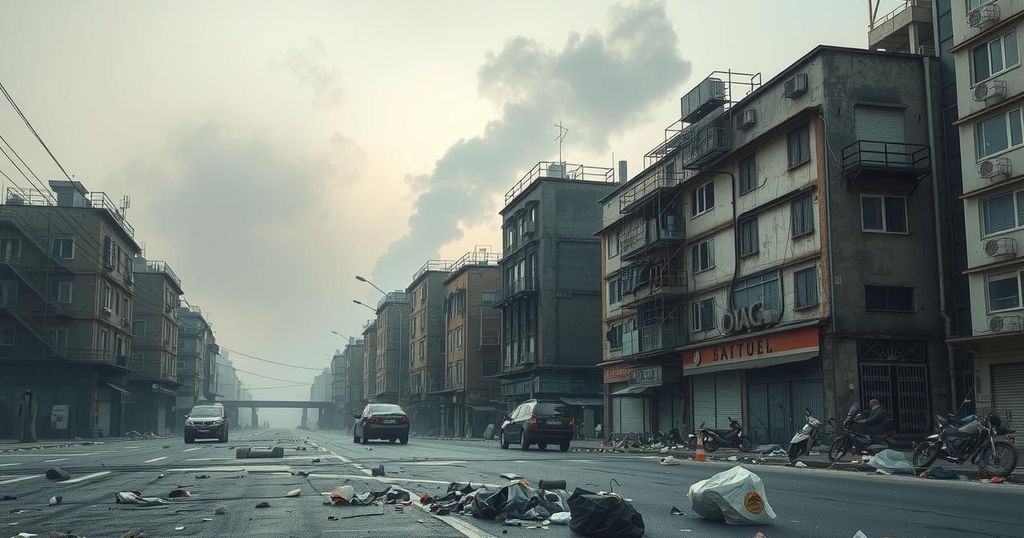Ghana, Nigeria, Chad, and Rwanda Identified as Leading Polluted Nations in 2024 Report

The 2024 World Air Quality Report identifies Ghana, Nigeria, Chad, and Rwanda as among the world’s most polluted countries, highlighting alarming PM2.5 levels. Chad tops the list with concentrations far exceeding WHO guidelines, leading to severe public health risks. Ghana’s air quality crisis is escalating, necessitating immediate policy interventions to mitigate pollution effects and protect public health.
The 2024 World Air Quality Report highlights critical air pollution levels in various African nations, notably Ghana, Nigeria, Chad, and Rwanda, which rank among the most polluted globally. These findings underscore a deteriorating air quality crisis that threatens millions of lives across the continent.
Chad stands at the forefront, with an alarming PM2.5 concentration of 91.8 µg/m³, a staggering 18 times higher than the World Health Organization’s (WHO) safe annual guideline of 5 µg/m³. Following closely, Nigeria ranks 11th with a level of 40.1 µg/m³, and Rwanda is positioned 9th at 40.8 µg/m³. Ghana, categorized 14th globally, has recorded PM2.5 levels of 35.8 µg/m³.
PM2.5 particles are particularly harmful, as they infiltrate the lungs and bloodstream, leading to grave respiratory and cardiovascular issues. These pollutants are minute, significantly smaller than dust and more than ten times thinner than human hair, making them nearly invisible yet extremely hazardous.
The University of Chicago’s data reveals that air pollution has reduced life expectancy in affected regions by 2.7 years. Furthermore, estimates indicate that air pollution caused approximately 8.1 million deaths globally in 2021, equivalent to roughly 22,192 fatalities each day. Tragically, a child succumbs to air pollution every minute, emphasizing the urgent need for intervention.
In Ghana, PM2.5 levels have surpassed the WHO’s safe limit by seven times, indicating a severe and worsening air quality issue. Accra holds the distinction of being the 16th most polluted capital city globally, with an annual PM2.5 level of 36.3 µg/m³. Shockingly, Kumasi has emerged as Ghana’s most polluted city, registering 39.5 µg/m³ for the first time.
The pollution levels in Ghana have ascended alarmingly over the years. In 2022, Ghana was ranked 27th with a PM2.5 level of 30.2 µg/m³, rising to 17th in 2023 at 33.2 µg/m³, and hitting a record of 35.8 µg/m³ in 2024, now occupying the 14th position in global pollution rankings.
The 2024 report also reveals Africa’s struggle against severe air pollution, with five of the top ten most polluted countries located on the continent. Notably, only 24 out of 54 African nations submitted air quality data due to insufficient monitoring infrastructure. Over a third of African cities reported PM2.5 levels that are 3-5 times above WHO guidelines, and 24% noted levels exceeding 5-7 times higher.
The air pollution crisis in Ghana transcends environmental concerns, manifesting as a pressing public health emergency. The WHO estimates attribute 28,000 annual deaths in Ghana to air pollution—equivalent to one death every 19 minutes. Continued negligence in addressing air pollution could lead to monthly fatalities of at least 2,333 individuals.
With Ghana witnessing a rapid deterioration in air quality, experts advocate for immediate government intervention, including stricter vehicle emission regulations, greater investment in renewable energy sources, expanding air quality monitoring networks, and enforcing stringent anti-burning policies.
In the global context, 17% of cities worldwide comply with WHO air quality standards, while some regions maintain relatively clean air. Countries like Australia, Iceland, and New Zealand are noted for meeting WHO guidelines.
Africa’s air pollution is driven by rapid urbanization, population increase, emissions from industries, and unregulated waste burning. The IQAir report highlighted that NGOs currently provide 67% of air quality data, marking an increase from 42% in 2023, which indicates an urgent need for enhanced governmental monitoring capabilities.
The latest 2024 World Air Quality Report illuminates a dire air pollution crisis in multiple African nations, particularly Ghana, Nigeria, Chad, and Rwanda, which rank amongst the most polluted countries globally. The startling PM2.5 levels reported signify a significant public health threat, demanding immediate governmental action to improve air quality standards and implement effective pollution control measures to avert further loss of life and health deterioration in affected populations.
Original Source: www.myjoyonline.com






